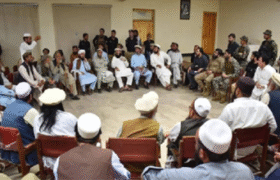Terrorists have caused significant losses to lives and properties in Pakistan over the past two decades. In response, law enforcement agencies and security forces have actively combated this menace through effective military and Intelligence-based operations. To ensure the swift prosecution of detained and surrendered terrorists, the anti-terrorism courts (ATCs) were revitalized in 2009. Originally established in 1997 under the Anti-Terrorism Act, this legal framework was updated to address inefficiencies in the traditional judicial system. While robust, the conventional courts were often perceived as too slow to handle the urgent demand of counter-terrorism cases, making the strengthened ATC infrastructure a crucial step forward.
The ATCs played a pivotal role in ensuring the timely prosecution of cases and the swift dispensation of justice. Their efficiency has also helped reduce the backlog of cases in civil courts. In 2019, the ATCs demonstrated impressive performance, especially when compared to the mediocre results of conventional courts during the same period. Thanks to their professionalism and commitment to national security, the ATCs successfully resolved 31 cases, including four related to terrorism. Some high-profile cases, such as the murder of Punjab’s former Interior Minister Shuja Khanzada, remain under trial and have been carried over to subsequent years. The dedication of the ATCs to upholding justice has reinforced their critical role in the legal system.
However, Pakistan’s legal system often struggles to adapt to the complex challenges of prosecuting dangerous terrorists and handling counterterrorism cases effectively. A key issue raised by security forces is the recurring cycle where dangerous terrorists are apprehended after significant effort, only to be released by the courts due to procedural shortcomings or insufficient evidence. This highlights the urgent need for reforms to enhance the judiciary’s capacity to address the unique demands of counter terrorism justice.
In this context, the need for robust and efficient legal frameworks to support emergency measures—while respecting fundamental rights—remains critical. Recognizing these challenges, Chief Justice of Pakistan (CJP) Yahya Afridi established a committee to review loopholes in the justice system. He highlighted concerns over the significant backlog of cases in Anti-Terrorism Courts (ATCs) across the country and stressed the importance of expediting pending trials to ensure timely justice.
A review of the performance of Anti-Terrorism Courts (ATCs) highlighted several key challenges, including a backlog of 2,273 pending cases nationwide. Of these, a significant 1,372 cases are awaiting resolution in Sindh. Addressing this backlog is crucial to ensuring the swift and efficient delivery of justice in anti-terrorism cases.
The Anti-Terrorism Courts face several contemporary challenges, including inadequate security for witnesses, limited facilities for online witness appearances, the absence of advanced forensic laboratories to support evidence-based decisions, and insufficient additional ATCs to handle the growing caseload effectively.
To strengthen the judiciary, the Chief Justice issued directives for establishing the Sindh Forensic Science Laboratory and assisting Balochistan in operationalizing advanced forensic labs in Quetta. He also recommended that justice.outgoing ATC judges be reassigned to suitable roles and proposed that high-performing ATC judges receive opportunities for international training with support from the Law and Justice Commission.
In addition, the government plans to take swift and coordinated action to address the infrastructure and resource needs of Anti-Terrorism Courts (ATCs), which are essential for ensuring timely and fair outcomes in anti-terrorism cases.
Separately, to tackle delays in tax-related cases, Chief Justice Yahya Afridi has launched an initiative at the Supreme Court to resolve longstanding disputes. The Chief Justice emphasized the significant backlog of fiscal cases across various judicial forums, including the Supreme Court, where 3,496 cases involving Rs97 billion in revenue remain pending. Collaborative efforts are underway to expedite the resolution of these cases and improve the efficiency of fiscal Chief Justice Yahya Afridi has launched an initiative at the Supreme Court to address the longstanding backlog of tax cases. The enormous
volume of fiscal disputes pending across judicial forums—particularly in the Supreme Court—was emphasized. As part of the initiative, professionals from various fields will evaluate available resources, assess the effectiveness of court processes, and identify challenges before finalizing a “workable reform plan” with clear timelines and an impact assessment mechanism.
Proposed reforms for Anti-Terrorism Courts (ATCs) aim to reduce case backlogs by enhancing accessibility, increasing transparency, simplifying legal processes, integrating technology, and adopting a citizen-centric approach within the existing legal framework.
To tackle these challenges effectively, all stakeholders—including the government and the bar—must actively collaborate. Their collective efforts are crucial to addressing the significant case backlog, ensuring public safety and national security, and safeguarding the fundamental rights of citizens.
The challenges faced by Pakistan’s judiciary, particularly in addressing anti-terrorism cases, highlight the pressing need for systemic reforms. Despite the establishment of specialized courts like the Anti-Terrorism Courts (ATCs) and the proactive measures taken by Chief Justice Yahya Afridi, significant gaps remain in infrastructure, resources, and procedural efficiency. The backlog of thousands of cases underscores the urgency to modernize court operations and adopt innovative solutions that prioritize accessibility, transparency, and timely justice. Addressing these issues is not only critical for ensuring the effective prosecution of terrorists but also for upholding public trust in the judiciary and safeguarding citizens’ fundamental rights.
Written By: Laila Sadaf





